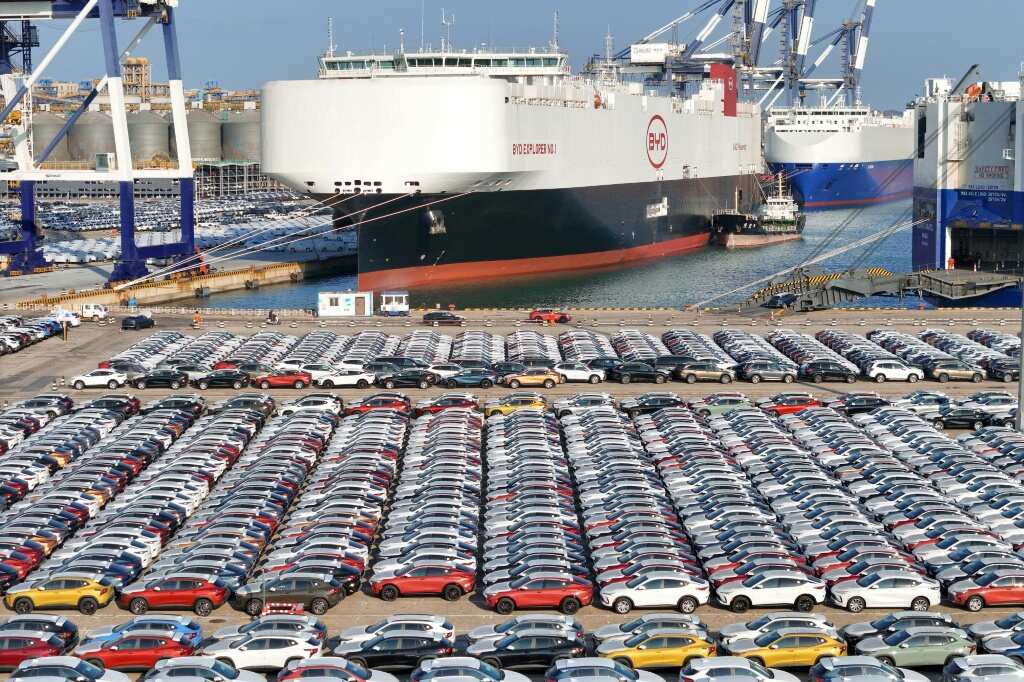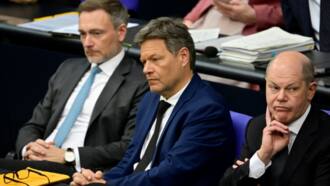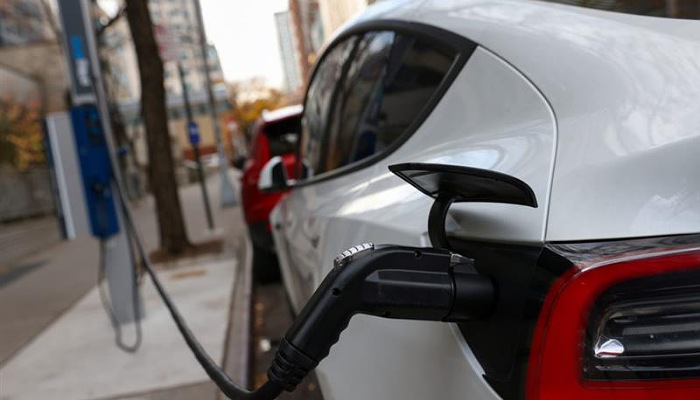
Photo: STR / AFP/File
Source: AFP
Germany’s Vice Chancellor Robert Habeck will arrive in Beijing on Friday on a last-ditch mission to avoid a damaging trade war with China after the EU threatened to slap additional tariffs on electric cars.
If a compromise is not reached between Brussels and Beijing, the European Commission will impose extra tariffs of up to 38 percent on Chinese electric vehicles it says have benefitted from unfair subsidies.
The new higher tariff rate would first be imposed provisionally, before becoming definitive in November.
“What is important now is that we talk,” Habeck said following the bombshell EU announcement. Using tariffs to exert political pressure was “the last resort and often the worst option”, he said.
In China, the minister, who looks after the government’s climate and economy briefs, will have meetings with his counterparts for industry and trade.
Officials in Habeck’s ministry have noted that he is “not speaking and not negotiating in the name of the European Commission” — however, Brussels will need the support of Europe’s largest economy for its next steps.
PAY ATTENTION: Сheck out news that is picked exactly for YOU ➡️ find the “Recommended for you” block on the home page and enjoy!
Germany’s large and influential auto manufacturers are fearful of a trade war with Beijing that could rebound on their business activities in China.
For Mercedes-Benz, Volkswagen and BMW the Chinese market represents up to 36 percent of their sales.
Solution finder
China topped the list of Germany’s trading partners in 2023 for the eighth year in a row, ahead of the United States.
“I think Habeck probably is hoping to find some sort of deal or solution and at the very least to get China to not retaliate,” Jacob Gunter, senior analyst at China-focused think-tank MERICS.
For China, the goal “will be to try to get Germany to play a bigger role in getting rid of, or at least mitigating, the EV tariffs that Brussels set up last week”, Gunter said.

Photo: Odd ANDERSEN / AFP
Source: AFP
It would be a hard ask for Habeck to get Beijing to reduce its subsidies for electric vehicles, Gunter said.
But convincing China not to pursue a “significant retaliation” would be a good outcome.
However, speaking in South Korea before arriving in China, Habeck downplayed the chances of finding a quick solution to the dispute, saying that the “signs are rather challenging”.
China said Monday it had launched an anti-dumping investigation into pork imports from the European Union, threatening Spanish exports.
But Beijing has an interest in avoiding an escalating trade conflict with the EU and other countries trying to shield their economies from Chinese imports, according to experts.
‘Market distortions’
Another problem for Habeck is that the various German companies present in China are not all on the same page about tariffs.
Machinery and equipment manufacturers, which are particularly exposed to Chinese competition, have taken a tougher line.
“The unfair subsidising of Chinese businesses by the state must stop,” said Germany’s influential engineering association VDMA, calling on Habeck to broach the “market distortions” created in Europe by Beijing’s economic policy.
In a signal that Habeck will not simply be a mouthpiece for carmakers, not one of the auto giants is in his delegation — unlike the group that travelled with Chancellor Olaf Scholz to China in April.
Habeck’s party, the Greens, are also decidedly more critical of China than Scholz’s Social Democrats.
If China were to retaliate with tariffs on car imports from Germany, it is not clear that this would have a “meaningful impact” on the country’s auto sector, which mostly exports its most expensive — and less price-sensitive — models to China, said Gunter.
At the same time, the traditional auto groups faced growing competition from cheaper Chinese manufacturers in their domestic European market.
In the space of just three years, the import volumes of Chinese cars have increased ten-fold, according to the German statistics agency.
Source: AFP











